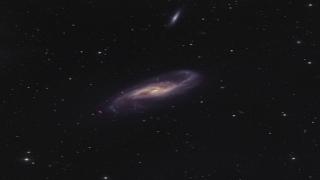Bibcode
Knapen, J. H.; Cisternas, M.
Bibliographical reference
The Astrophysical Journal Letters, Volume 807, Issue 1, article id. L16, 4 pp. (2015).
Advertised on:
7
2015
Citations
22
Refereed citations
20
Description
We complement a recent Letter by Luo et al. by comparing the fraction of
starburst galaxies that are interacting with the overall fraction of
interacting galaxies in the nearby galaxy population (within ∼40
Mpc). We confirm that in starburst galaxies the fraction of interacting
galaxies is enhanced, by a factor of around two, but, crucially, we do
so by studying a sample of almost 1500 of the nearest galaxies,
including many dwarfs and irregulars. We discuss how adjusting the
starburst definition influences the final result and conclude that our
result is stable. We find significantly lower fractions of interacting
galaxies than Luo et al. did from their larger but more distant sample
of galaxies, and we argue that the difference is most likely due to
various biases in the sample selection, with a representative sample of
the nearest galaxies, such as the one used here, being the best possible
representation of a general picture. Our overall conclusion is that
interactions can and do increase the number of starburst galaxies, and
that this result is extremely robust. By far, most starburst galaxies,
however, show no evidence of a present interaction.
Related projects

Spiral Galaxies: Evolution and Consequences
Our small group is well known and respected internationally for our innovative and important work on various aspects of the structure and evolution of nearby spiral galaxies. We primarily use observations at various wavelengths, exploiting synergies that allow us to answer the most pertinent questions relating to what the main properties of
Johan Hendrik
Knapen Koelstra